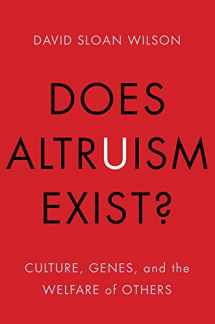
Does Altruism Exist?: Culture, Genes, and the Welfare of Others (Foundational Questions in Science)
ISBN-13:
9780300219883
ISBN-10:
0300219881
Edition:
Reprint
Author:
David Sloan Wilson
Publication date:
2016
Publisher:
Yale University Press
Format:
Paperback
192 pages
FREE US shipping
Book details
ISBN-13:
9780300219883
ISBN-10:
0300219881
Edition:
Reprint
Author:
David Sloan Wilson
Publication date:
2016
Publisher:
Yale University Press
Format:
Paperback
192 pages
Summary
Does Altruism Exist?: Culture, Genes, and the Welfare of Others (Foundational Questions in Science) (ISBN-13: 9780300219883 and ISBN-10: 0300219881), written by authors
David Sloan Wilson, was published by Yale University Press in 2016.
With an overall rating of 3.6 stars, it's a notable title among other
books. You can easily purchase or rent Does Altruism Exist?: Culture, Genes, and the Welfare of Others (Foundational Questions in Science) (Paperback) from BooksRun,
along with many other new and used
books
and textbooks.
And, if you're looking to sell your copy, our current buyback offer is $0.3.
Description
A powerful treatise that demonstrates the existence of altruism in nature, with surprising implications for human society
Does altruism exist? Or is human nature entirely selfish? In this eloquent and accessible book, famed biologist David Sloan Wilson provides new answers to this age-old question based on the latest developments in evolutionary science.
From an evolutionary viewpoint, Wilson argues, altruism is inextricably linked to the functional organization of groups. “Groups that work” undeniably exist in nature and human society, although special conditions are required for their evolution. Humans are one of the most groupish species on earth, in some ways comparable to social insect colonies and multi-cellular organisms. The case that altruism evolves in all social species is surprisingly simple to make.
Yet the implications for human society are far from obvious. Some of the most venerable criteria for defining altruism aren’t worth caring much about, any more than we care much whether we are paid by cash or check. Altruism defined in terms of thoughts and feelings is notably absent from religion, even though altruism defined in terms of action is notably present. The economic case for selfishness can be decisively rejected. The quality of everyday life depends critically on people who overtly care about the welfare of others. Yet, like any other adaptation, altruism can have pathological manifestations. Wilson concludes by showing how a social theory that goes beyond altruism by focusing on group function can help to improve the human condition.
Does altruism exist? Or is human nature entirely selfish? In this eloquent and accessible book, famed biologist David Sloan Wilson provides new answers to this age-old question based on the latest developments in evolutionary science.
From an evolutionary viewpoint, Wilson argues, altruism is inextricably linked to the functional organization of groups. “Groups that work” undeniably exist in nature and human society, although special conditions are required for their evolution. Humans are one of the most groupish species on earth, in some ways comparable to social insect colonies and multi-cellular organisms. The case that altruism evolves in all social species is surprisingly simple to make.
Yet the implications for human society are far from obvious. Some of the most venerable criteria for defining altruism aren’t worth caring much about, any more than we care much whether we are paid by cash or check. Altruism defined in terms of thoughts and feelings is notably absent from religion, even though altruism defined in terms of action is notably present. The economic case for selfishness can be decisively rejected. The quality of everyday life depends critically on people who overtly care about the welfare of others. Yet, like any other adaptation, altruism can have pathological manifestations. Wilson concludes by showing how a social theory that goes beyond altruism by focusing on group function can help to improve the human condition.


We would LOVE it if you could help us and other readers by reviewing the book
Book review

Congratulations! We have received your book review.
{user}
{createdAt}
by {truncated_author}


